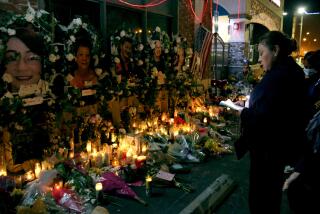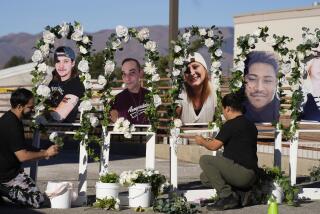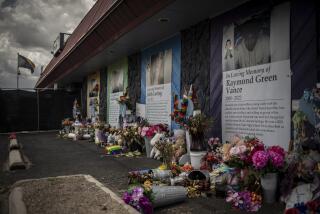Aurora theater shooting: Judge allows charity to contact victims
- Share via
CENTENNIAL, Colo. -- With $4 million already raised nationwide in the four weeks since the Aurora movie theater rampage, prosecutors asked the court Thursday to let a victim’s advocacy group contact victims and their families to begin disbursing the funds.
Judge William Sylvester agreed, with the caveat that the victims first must agree to be contacted.
“Everyone in this courtroom feels a humanitarian urge” to help victims of the July 20 mass shooting, said Deputy Dist. Atty. Rich Orman. He asked that the names, phone numbers and email addresses be unsealed and turned over to the Colorado Organization for Victims Assistance.
“There are many victims who may be incapacitated or have lost family members and are in very dire straits,” he said, adding that some need help with such basics as rent and food.
Twelve people died and 58 others were wounded when a gunman opened fire in the packed movie house during a midnight screening of “The Dark Knight Rises.”
James E. Holmes faces 141 felony counts – including 24 counts of murder – in connection with the mass shooting.
Holmes was in court again Thursday. Now bearded with his natural brown hair growing out under a mop of neon orange curls, he appeared more engaged with the proceedings than during previous appearances. But he remained silent and showed no emotion as Orman talked about the victims’ distress.
Nancy Lewis, executive director of the Colorado Organization for Victims Assistance, told the Los Angeles Times that the group would release details in coming days to outline the mechanism by which money would be distributed and need determined. She added that many of the victims are already receiving help from victim advocates connected with law enforcement agencies and the district attorney’s office.
In other court proceedings, an attorney for the University of Colorado turned over two identical packets containing about 100 pages of documents subpoenaed by the prosecution. Holmes was a doctoral student at the university’s elite neuroscience program but withdrew about six weeks before the shooting. It is unclear what is in those documents because most materials in the case remain sealed. However, the judge verified that they did not contain medical records.
Tamara Brady, one of Holmes’ court-appointed defense attorneys, asked that the records not be allowed into evidence. A hearing on that issue is scheduled for next week. It is the latest in the legal wrangling over Holmes’ time at the university and sets up the larger confrontation expected over doctor-patient privilege. While a student, Holmes reportedly sought mental health counseling and may have sent a notebook to Dr. Lynn Fenton, his psychiatrist, outlining his plans.
Under Colorado law, a psychiatrist has an obligation to warn authorities if a patient makes a specific threat. Fenton reportedly was alarmed enough by Holmes to tell colleagues in a threat assessment team and campus police, but what might have caused her concern remains secret.
The legal showdown over patient privilege is scheduled for Aug. 30.
ALSO:
Elvis candlelight vigil surprise: Priscilla and Lisa Marie
Keystone XL pipeline construction begins amid protests
Ted Nugent’s drummer pleads not guilty to alleged golf cart joyride
More to Read
Sign up for Essential California
The most important California stories and recommendations in your inbox every morning.
You may occasionally receive promotional content from the Los Angeles Times.










